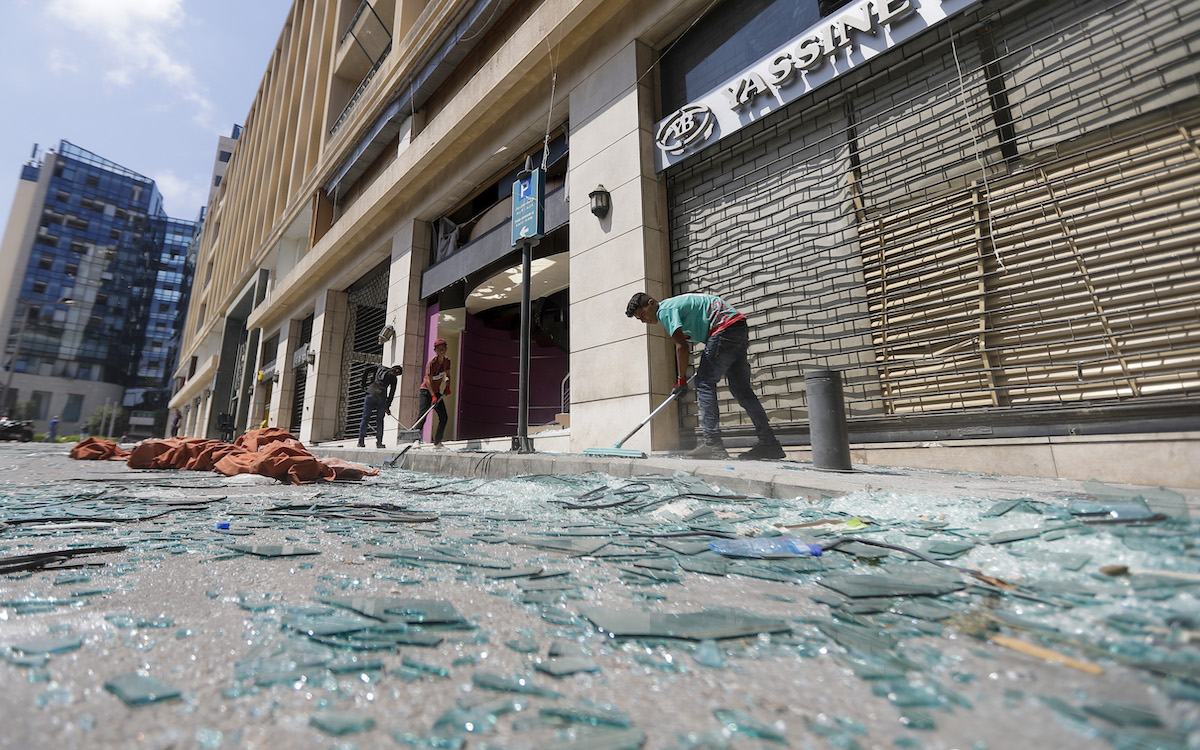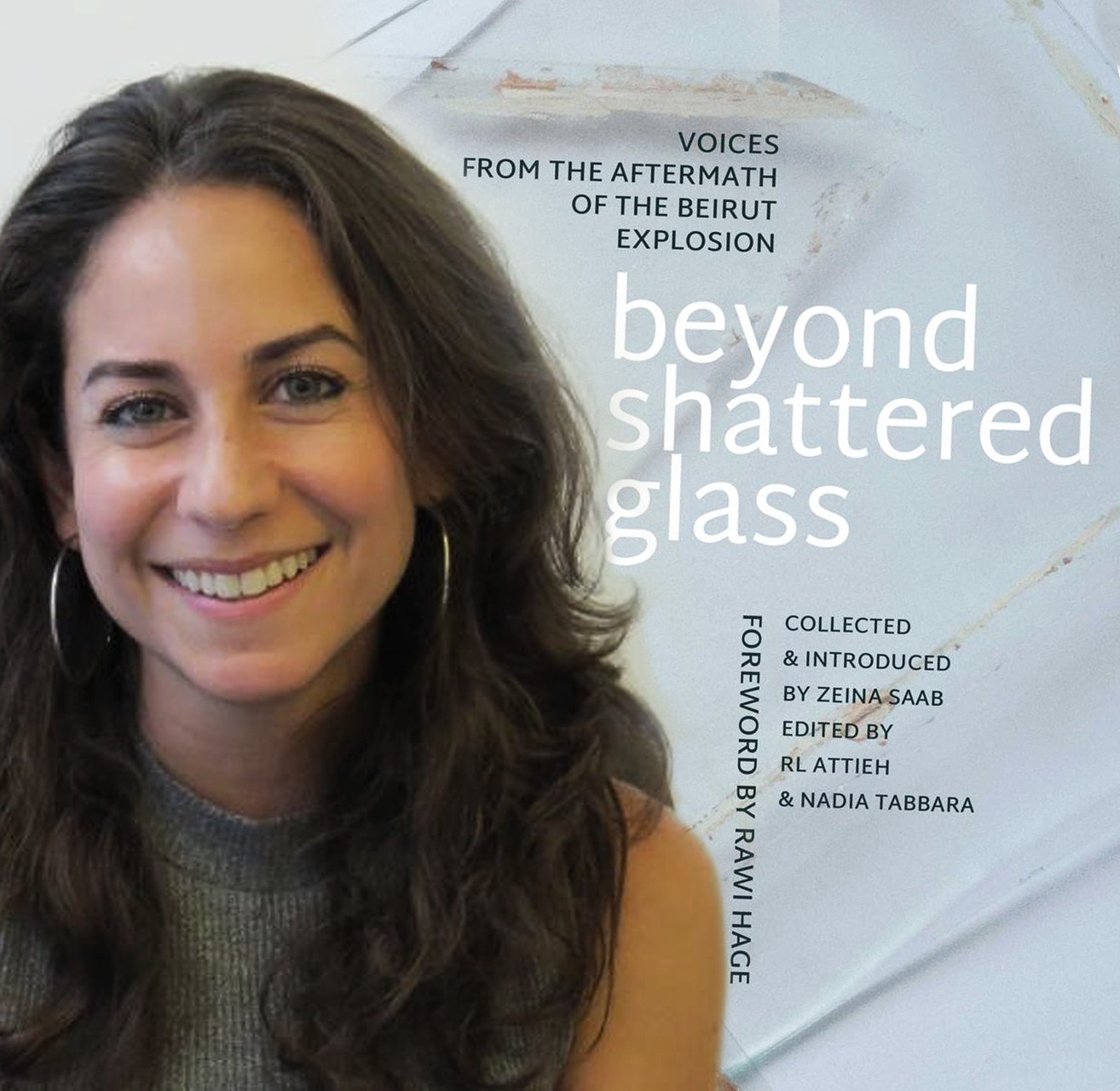
Three years ago, the once-vibrant heart of Lebanon was shattered by a terrifying explosion at the Port of Beirut, ending more than 200 lives and altering tens of thousands of others forever. Yet, despite an ongoing investigation and innumerable calls for accountability, those responsible continue to evade questioning, prosecution, and – ultimately – justice.
In her new book released this month, Beyond Shattered Glass, Zeina Saab, who has spent the intervening years working with both explosion survivors and a team of writers, brings together 22 unique tales of Beirut, its people and their experiences, both during and after the tragic events of August 4, 2020.
“This explosion [represents] all of what is wrong with Lebanon, rotting for years,” Saab told NOW Lebanon. “It shows what turning a blind eye can do. These were leaders who were supposed to be protecting us, when really they didn’t lift a finger.”
“[We wanted] something that could resonate with people who have faced tragedy and injustice – really traumatic events – and make them realize that, even in the most painful times, beautiful things can happen where people come together to support each other,” she explained.
These accounts form a record of the suffering of Beirut, but also highlight the resilience and heroism of those who found themselves caught up in the disaster. The process of piecing together these stories has been a long and often challenging one.
The idea for a book telling the stories of survivors of the Beirut Blast first came to Saab within the first few weeks after the explosion. In April 2021, she launched a crowdfunding campaign to finance a self-published work. Despite the freshness of Lebanon’s physical and psychological wounds, support for her idea was immediate and vocal. The proposed project received $15,000 (USD) within just 10 days.
“I think – in the midst of all the grief and the pain – people wanted to hear the stories of how [we] came together to support each other,” said Saab.
As she moved forward, Saab also received feedback that she should attempt to find a publisher, to help elevate the voices of her contributors to a wider, more international audience, projecting their stories outside of Lebanon. This would eventually bring her into contact with Interlink Books, an independent publishing house based in the United States.
August 4 was ever-present in our minds [as we were] re-reading these stories, reliving the trauma and the grief [for] three years. Right before we submitted the final manuscript, I had to re-read all the stories. It took seven hours and I was an absolute emotional wreck by the end. I was crying. I was heartbroken.
Initially, Saab had planned to finish the book within a year. However, Saab quickly realized that these personal accounts – while often both inspirational and deeply painful – would require additional work to make them suitable for the format of a book.
This led her to seek out other professional writers who would work with her contributors to understand their stories, and produce creative nonfiction that would improve readability while remaining accurate to the survivors’ experiences.
“The goal wasn’t to just document testimonials,” explained Saab. “[We wanted to] really capture the stories in a powerful and memorable way, so we started to think: how can we do this differently?”
“I wish we could have different editions, because there are so many other stories out there that just didn’t make it into the book [or] that I learned about too late,” she lamented. “That’s something that is always lingering in my mind but, ultimately, it has to stop somewhere.”
As the project evolved and expanded in scope, however, so too did the amount of time it required. Many of those working on the book were having to do so on their own time outside of their professional working hours, making progress slow, especially as Lebanon’s economic crisis continued to deepen.
 Care also had to be taken regarding the mental well-being of all involved. While the project offered many of those willing to share their own experiences an opportunity to come to terms with their own trauma and reach something approaching closure – or direct their anger and frustration in a more constructive manner – it remained a hard memory to speak about and explore, for both the contributors and the writers.
Care also had to be taken regarding the mental well-being of all involved. While the project offered many of those willing to share their own experiences an opportunity to come to terms with their own trauma and reach something approaching closure – or direct their anger and frustration in a more constructive manner – it remained a hard memory to speak about and explore, for both the contributors and the writers.
“We didn’t force anything on anybody,” Saab insisted. “We made sure that everybody was comfortable. Those who accepted wanted their stories to be shared with the world, and we are so grateful that they were [willing] to do that. The topics were difficult and obviously painful to revisit, but I feel it was part of a process of reflection and processing for everybody who was a part of this.”
“It was very difficult for all of us,” she admitted. “August 4 was ever-present in our minds [as we were] re-reading these stories, reliving the trauma and the grief [for] three years. Right before we submitted the final manuscript, I had to re-read all the stories. It took seven hours and I was an absolute emotional wreck by the end. I was crying. I was heartbroken.”
Many Lebanese remain traumatized by the events of the Beirut Blast, having lost friends and loved ones, or their homes. Others have suffered permanent injuries that will result in lifelong disabilities. As time has gone by, however, the fury and outrage of the Lebanese against those who allowed this tragedy to occur has dulled.
When people read – and remember what happened and what we went through – the outrage and the anger come back. So many people are fighting corruption and the abuse of power. We’re not the only ones, and we’re not alone. This is what happens when there’s no rule of law. This is what happens when we let corruption be rampant.
The Lebanese Judiciary’s official investigation into the cause of the Beirut Port explosion has been consistently stymied and undermined at every turn by political interference, often at the hands of those suspected to be responsible. Despite repeated calls from both the general public and the international community, not a single one of the high-ranking officials implicated has been held to account, protected from prosecution by their Parliamentary immunity.
Those protesting against this injustice have been met with brutal suppression techniques, including teargas, rubber bullets, and even live rounds. As protests have become increasingly infrequent and the Lebanese economic crisis grinds on, the event that once sparked a ‘Day of Rage’ has become just another bitter moment in a litany of incompetence, cronyism, and contempt.
For Saab, this book is a lesson – and a warning – against complacency in the face of corruption.
“At this point, we’re going down to the streets, but no one is listening,” she said. “Our efforts and energy are going to be dissipated. We’ve experienced this time and time again. I hope that those responsible will be held accountable, but we know Lebanon and what it’s going to take in order to put those responsible on trial.”
“When people read – and remember what happened and what we went through – the outrage and the anger come back,” she continued. “So many people are fighting corruption and the abuse of power. We’re not the only ones, and we’re not alone. This is what happens when there’s no rule of law. This is what happens when we let corruption be rampant.”
Following the launch of Beyond Shattered Glass, one hundred percent of the proceeds raised through sales of the book will go to victims of the August 4 Beirut Port explosion and their families.
Robert McKelvey is a multimedia journalist with @NOW_leb. He tweets @RCMcKelvey.







